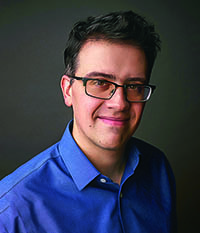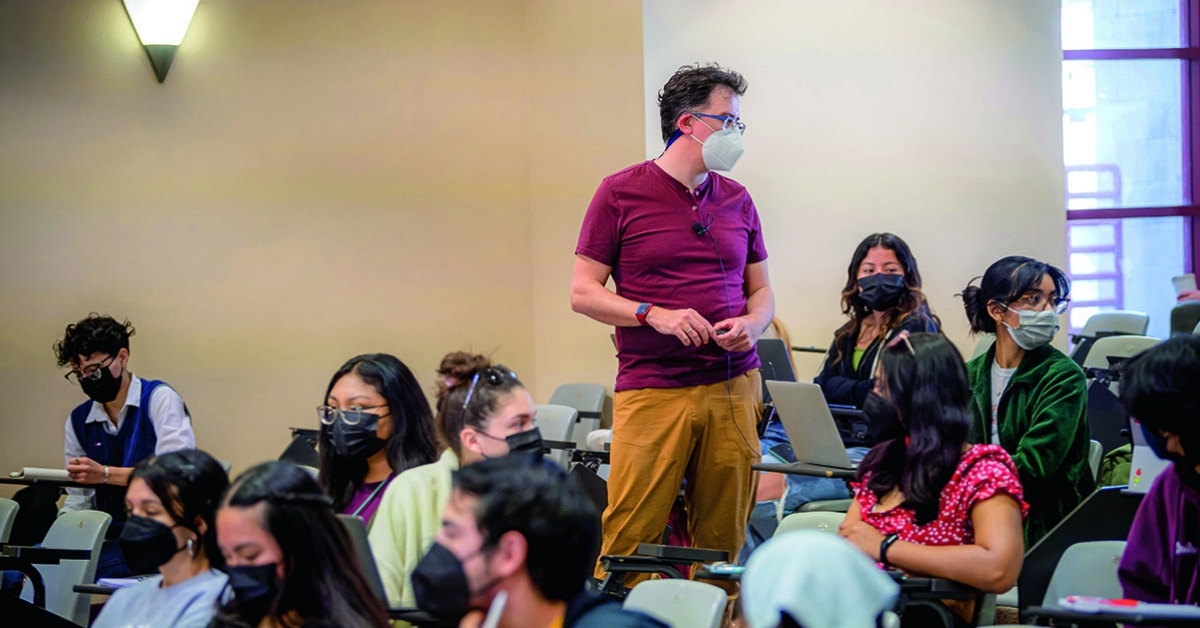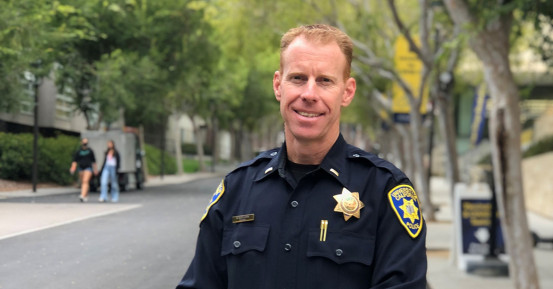Community Matters
Sociology professor redefines classroom culture, on student at a time.
Published Date
Story by:
Share This:
Article Content
This story was published in the Fall 2022 issue of UC San Diego Magazine
For political sociologist Michel Estefan, it’s not enough to just talk about community and inclusivity. If they are to become a reality, these values must be put into practice.
Estefan, an assistant teaching professor in UC San Diego’s Department of Sociology, works to build community in his classes and a culture of collaboration. “If you say ‘community matters’ but then every single grade is individual, how much does community matter?” says Estefan, who also researches and publishes on pedagogy. “If you really want community, it has to be embedded in the rules that organize student interactions in the classroom.”
So every week, Estefan gives a group quiz with a collective grade.
Based on the prior week’s reading assignments, students discuss and answer multiple-choice questions together. The entire group must submit the same answers, except one—the very last—where students grade themselves on their contributions to the group. The decision rule for the collaborative portion, Estefan notes, is by consensus, not a simple majority, “because then the majority has to bring in the minority—they have to persuade and can’t just overrule.”
But a quiz alone, even on a weekly basis, isn’t enough to knit students together and give everyone an opportunity to excel.

For that, he starts with a solid course design. It is important not only to be clear and transparent in expectations but also to set them in such a way that all students can succeed, wherever they are in their lives.
Estefan makes sure that no one exam or assignment is worth so much (e.g., 40% or more) that it dooms a student’s grade if they have an emergency or added responsibilities, or just don’t bring their best selves to the task. He also puts three possible extra-credit assignments directly into the syllabus, signaling from the start that he won’t police a student’s time and that they can make up points if they miss some deadlines.
“I’ve been many students,” says Estefan, who went to schools in Mexico before going on to earn his doctorate at UC Berkeley. “I’ve been the star student. But I’ve been the mediocre student and the struggling student.”
Estefan grew up in a single-parent household. His father had a degree in accounting. But his mother, with whom he lived after his parents split, never went to college. Partway through his doctorate program, Estefan’s mother was diagnosed with lung cancer. He spent a lot of time traveling back to Mexico to be with her before she passed. He also became a father while in graduate school. But at no point, he says, was he made to feel by his mentors like he had to choose between his studies and his family, or that he was somehow falling behind. “I always felt supported,” he says, “not just in my academic work but also my personal life—the context in which my academic life was unfolding.”
That lesson stuck with him, as did earlier examples of teachers who were also keen to connect with students as complete individuals.
And because of those experiences, Estefan begins his courses with welcome surveys. That doesn’t mean asking cute questions about pets or music preferences (though those don’t hurt) but finding out about students’ life circumstances and whether they’ve already done the types of assignments the class requires.
“You have to start from who your students are—how many are working two jobs or how many are commuting from L.A.?” he says. “How many have never done the kind of essay I’ll be asking them to do? How can I then scaffold their learning?”
In place of the more traditional “office hours,” he offers “student hours.” And to emphasize that this time is for the students, he makes it part of their participation grade that they must visit him or his T.A. at least once for a conversation. He also organizes students for the duration of a course into small groups called “support pods,” and he checks in with the pod leader periodically to see if at a given moment any of the students might need more attention or support.
Coming at the course material from the perspective of a student is also key, Estefan says.
“The question is not what should a political sociologist know,” Estefan says, “but what aspects of political sociology would best help my students achieve their learning goals? When you shift your thinking to the point of view of the students, everything changes.”
Share This:
You May Also Like
Stay in the Know
Keep up with all the latest from UC San Diego. Subscribe to the newsletter today.





